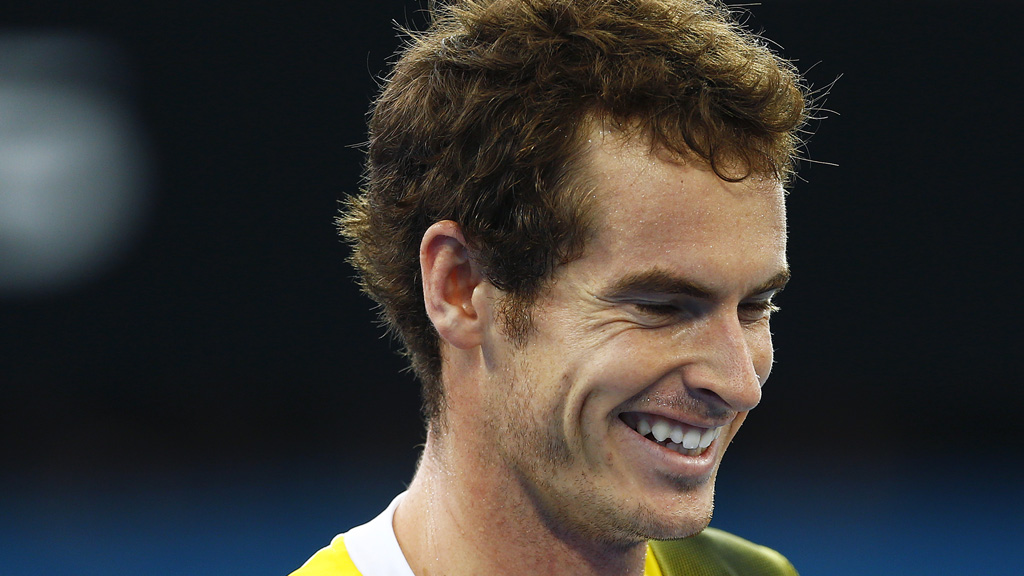Why a happy Andy Murray is a winning Andy Murray
Andy Murray starts the year a grand slam winning Olympic champion unafraid to show his emotions. But can he build on the momentum of 2012? Sports psychologist Rebecca Symes speaks to Channel 4 News.

Andy Murray starts his Australian Open campaign against Dutchman Robin Haase on Tuesday, with high hopes of serving up another grand slam victory to follow his US Open triumph in September.
He faces a possible quarter-final match-up with big-hitting Argentinean Juan Martin Del Potro which could land him a semi-final with Roger Federer and a final showdown with Novak Djokovic. But Murray, who beat both those old foes to win Olympic gold, has a new bounce in his step – coupled with a new emotional confidence and a tendency to smile.
Murray goes into the Australian Open as the most recent grand slam winner – a confidence booster or unwanted pressure?
Rebecca Symes: Definitely a confidence booster. He is going into this tournament in excellent form and on the back of some of his best performances which is a great position to be in.
In 2012 Murray’s ability to show emotion was talked about a lot – it seems to be helping him, but is there a danger he could lose focus?
RS: Being able to control emotions during competition is definitely a skill that is required for optimal performance. Murray’s recent expressions of emotions have shown a different side to him and one which has helped the public warm to him even more. I don’t believe that this expression of emotion will cause him to lose focus. Quite the opposite, I think that he has shown he is able to channel this emotion into his performance in a positive way and help bring out his best tennis. He has also talked himself in interviews at being better able to deal with his frustrations on the court and quickly turning that around so it doesn’t fester and have a negative performance impact.
If there was ever a time for Murray to aim high, this is it. Rebecca Symes, sports psychologist
How would you advise him to maintain the momentum of 2012?
RS: Keep doing what he’s doing! Whatever he is doing at the moment is working. It’s important to reflect not just when things aren’t going well but also when things are going well so that you can have an awareness of what is helping you to be successful and therefore enable you to repeat those successful performances. So continue to be self-aware, really use recent past experiences to build robust confidence and maintain the ability to positively channel emotions into performance.
He’s got quite a tough draw – and probably needs to beat both Federer and Djokovic to win. All players say they take “one game at a time” but surely he’ll be thinking ahead – what should his strategy be?
RS: It’s important to acknowledge what your overall aim is (e.g. to win the tournament) but more importantly is acknowledging how to get there which involves focusing on the process. Staying focused on one game at a time, and within that one set at a time, one match at a time, one point at a time, one serve at a time etc. is likely to be a key strategy. Getting too far ahead of yourself can be a real risk for underperformance.
Is Britain the toughest place to be a sporting hero? Do we build ’em up, knock ’em down more than other nations, in your view?
RS: Tough question. I’m not sure it’s necessarily tougher in Britain compared to other nations but I think within sport there is definitely this notion of hero to villain status. Sports stars can be almost worshipped when they’re doing well but there is usually no shortage of people jumping on the band wagon when things start to go a little off course. This can potentially be damaging particularly to younger, less experienced players.
Murray is a very ambitious player. Realistically, what could he achieve in 2013. Are big goals, such as winning Wimbledon, sensible or dangerous?
RS: Yes there is no reason why they are not sensible goals. Having ambition and aiming high is all part of elite sport, however of course there has to be some level of reality check against them as setting yourself up to fail can potentially be dangerous. Goals can be reviewed and revised as the season progresses. What most important is mapping out a clear pathway of exactly how to achieve those goals, and if there was ever a time for Murray to aim high, this is it.
You can follow Rebecca Symes on Twitter @sportingsuccess
-
Latest news
-
Tim Booth of the band James’ on agism in music, topping the charts and AI6m

-
As India goes to the polls in the world’s largest election – what do British-Indians think?6m

-
Tees Valley: Meet the candidates in one of the biggest contests coming up in May’s local elections4m

-
Keir Starmer says public sector reform will be a struggle7m

-
Nicola Sturgeon’s husband Peter Murrell charged with embezzlement of funds from SNP1m

-




